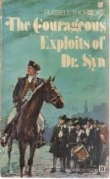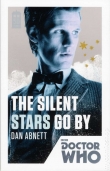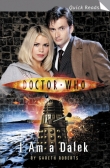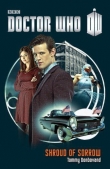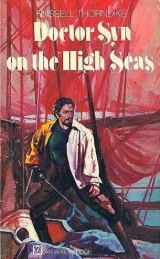
Текст книги "Doctor Syn on the High Seas"
Автор книги: Russell Thorndike
Жанр:
Исторические приключения
сообщить о нарушении
Текущая страница: 6 (всего у книги 14 страниц)
The Squire crouched panting against the paneling, breathing hard.
Doctor Syn retreated slowly, facing the Squire, until he passed the
fallen sword.
Then, with a superb gesture of command, he pointed to it with his own
weapon and said, “Pick it up.”
“And you’ll spit me as I do it,” snarled the Squire ungenerously.
“Had that been my way, I could have done it easier three seconds ago,”
replied the Doctor.
To gain time and recover his gasping breath, the Squire slowly
straightened himself, wiped the sweat from his brow, and then advanced
towards his sword with weary steps.
“Make haste sir,” cried Syn, “lest my patience snap. But I have no
interest to kill a man unarmed.”
Since everyone’s eyes were up on him, no one saw or heard the secret
panel behind the Squire’s back slide open. It was Syn who first saw the
farmer standing there. The Squire was about to pick up his sword when
the parson said, “For heaven’s sake, look behind you!”
“Another trick to catch me unawares?” sneered the Squire.
“I have never tricked you,” replied Syn. “I have fought fair. But
it seems that other hands than mine must kill you.”
The Squire realized that all eyes were upon something behind his
back, and so he slowly turned.
A bewildered look came over the Squire’s face as he tried to
recollect where he had seen this man before who now faced him with a
leveled pistol in his hand and grim, determined hate upon his face. He
was not long in doubt.
“I am Esther Sommer ’s father,” he said, in a hoarse whisper. “I have
come to
– 42 -
put Paid to your account.”
A flash, a deafening report, and then, amidst a stench of gunpowder,
they saw the Squire’s great body crumple down the boards. Nothing moved
save the twitching of his sword-hand and the curling smoke from the
steady barrel of the pistol.
It was a strange voice that brought the onlookers back to a state of
reality.
“This looks to me like murder.”
The speaker, who was quietly closing the door through which he had
entered, was richly dressed. He was short in stature, but broad shouldered and heavily built. His complexion was browned from foreign
sun, and his gold ear-rings indicated the sea as a profession. Unlike
the prevailing fashion, he wore his hair short-cropped and his black,
pointed beard gave him more the appearance of an Elizabethan than a
Georgian. While he smiles, as he was doing then, and showed his fine
white teeth, he was not unattractive. About the age of Doctor Syn, he
looked older, for he had lived hard and run the pace. His bearing
conveyed a recklessness which to feminine eyes at least appeared
romantic. Booted and spurred, he carried his riding cloak over his arm,
but as he advanced easily into the circle of light he tossed it from him
to a distant chair. It was then that Imogene recognized him, for with a
cry of joy she sprang forward, seized his hands in hers and said,
“Nicholas!”
“Of course,” observed Syn to Tony. “It is the Squire’s nephew.”
“And come in the nick of time to close my uncle’s eyes, it seems.”
His manner was almost jocular as he set the girl aside, with a
friendly patting of her hands, and surveyed the dying man upon the
floor.
Not even the pains of death which gripped him could disguise the
hatred of the Squire as he asked, “Have you come to crow at my death,
young cockerel?”
“I hurried from Spain, sir,” replied the nephew, “in response to your
last letter threatening to cut me off from the estate. I took the
precaution of calling upon the family lawyer in London, and no doubt you
will be desolated to learn that you have no means of carrying out such a
piece of petty spite. He was setting out for Oxford tomorrow in order to
inform you of this himself, but, as you see, I have forestalled him with
the good news.”
“I would have made him find the means,” replied the Squire.
“I rather think that the little misfortune which I see you in, dear
Uncle, will give me the estate within the hour. I have seen death writ
on faces before now.”
“Aye, I am done for this time,” went on the Squire, speaking with
increasing difficulty. “Had I lived tonight, I would have married the
girl, whom you had lost to the parson there. I warrant her child have
been a bar to your inheritance.”
“What does he mea n, Imogene?” asked the nephew.
“It means, Nicholas, that I am betrothed to Doctor Syn,” she
answered. “Tonight my mother and myself were brought here forcibly, but
Doctor Syn and Mr. Cobtree came to rescue us. Your uncle tried to kill
my lover, who pr oved himself the better swordsman. Indeed, your uncle
was disarmed when the shot was fired.”
Nicholas looked at the man who still held the pistol. “Why, it’s
Sommers. You lived across the river. I remember. You had a daughter.
I warned my uncle at the time that his peccadilloes would get him into
trouble. I think I heard she died.”
“Aye,” replied Sommers. “He killed her.”
– 43-
“So you kill him,” said Nicholas. “Well, all I can say, my friend,
is that you are in something of a fix. A duel’s a duel, and murder’s
murder.”
“I’ll swing for it if needs be. I am glad,” replied Sommers.
“Tut, man, let’s have no more corpses. While uncle obliges me by
dying as quickly as he can, I’ll think what’s best to do.”
As a reproof to his c allous hatred for his uncle, Doctor Syn took
cushions from chairs and propped the dying man into a more comfortable
position.
“Leave me alone,” said the Squire. “But give me wine.”
Imogene poured it out and took it to him. He tried to drink, but
could not. Instead he muttered to her through his clenched teeth:
“Will you tell me something, child?”
“What is it?” answered Imogene.
“That fellow Sommers,” he went on with an effort. “Regard him well,
and tell me how came such an ugly devil to possess so beautiful a
daughter. Yes, Sommers, your Esther was a pretty wench. I wonder now if
I’ll meet the jade?”
They were his last words. Doctor Syn knelt by him and felt the
heart. Then he slowly rose and said, “He is dead.”
“Well, I’ll be no hypocrite,” said Nicholas. “I always hated him.”
He picked up the dead man’s waistcoats and felt in the pockets. In
one of them he found a key, which he carried to a cabinet by the
fireplace. This he unlocked and searched amongst the many papers it
contained. At last he lit on a document, which he opened in haste. He
scanned it through and then said aloud, “To my nephew Nicholas Tappitt,
all my estate.” Then he looked at the others with a smile and added,
“So the rascal did not alter his will. My visit to the lawyer was not
true. I said it to frighten him. I think he could have left his money
where he would. However, it seems that I am safe. And now, gentlemen,
let us see about giving him a more regular death than he enjoyed. If
you gentlemen will agree to my plan, there will be no question of
murder. At dawn tomorrow Doctor Syn, with Mr. Cobtree here as second,
will meet my uncle in an affair of honour. As his nephew I will act for
him. I know a surgeon in the town who for a purse of guineas wi ll keep
his mouth shut, and certify death as regular. We’ll play the farce in
Magdalen Fields. It would seem a natural meeting-place. No possible
blame can fall on Doctor Syn for killing him, unless it is a rap over
the knuckles from the University Authorities. What do you say?”
The effrontery of this suggestion seemed to the others so
preposterous that they at first emphatically refused. But gradually
Nicholas made them see that only by such means could Sommers be saved
from trial.
“You may safely leave this to me to carry through,” said Nicholas.
“All you have to do is escort the ladies back to Oxford, and await me at
dawn in the Fields.”
“But why in Magdalen Fields,” asked Cobtree. “It could be managed
better here.”
“The pistol-shots must be heard in a more public place,” explained
Nicholas. “It will be the publicity of the affair that will deceive. I
will bring the body by coach. The surgeon and I will lay it on the
sward. Doctor Syn and I will fire the pistols into the air. The corpse
will be lifted back into the coach, and Sommers is at liberty to stay in
bed if he wishes. As to my servants here, they will obey me implicity.
They ever had a good regard for me, and hated my uncle. Let us release
your mother, Imogene, and I will send you by coach back to Oxford.”
– 44 -
“The dominance of Nicholas succeeded, and since nobody had a better
plan, they all took an oath of secrecy and agreed to carry out the grim
game. Vastly relieved at his salvation and accomplishment, the man
Sommers went the way he came, by boat. They found Imogene’s mother in
sad condition. The terror which she had gone through, added to the
physical pains from the brutalities that had been practiced on her, had
affected her poor brain, and they took her back to White Friars only
half conscious. Nicholas, who had locked the door upon his uncle’s
body, accompanied them in order to arrange with the surgeon, whom he
proposed to take back with him to Iffley. The good landlady at White
Friars was awaiting news anxiously, and was overjoyed to find the rescue
had been accomplished. The three men then left the ladies to her care,
and proceeded to the house of the questionable surgeon.
Accustomed to be called out in the night, they found no difficulty in
awakenin g him.
“It is by no means the first time that the rogue has done a dirty
piece of work at Iffley,” whispered Nicholas as they waited for him to
dress. “He’ll do whatever I ask of him, for I know enough to get the
rascal’s name struck off the Rolls.”
And so it proved. For twenty guineas he promised to arrange things
to their liking. He was perfectly willing to accompany Nicholas to
Iffley, for he was promised good wine upon arrival and so they went
their way, while Tony went back to Queen’s College w ith Doctor Syn,
where they kept vigil waiting for the dawn.
As they watched the night sky, Tony said, “I only hope that the
killing of this bully will not ruin your career, Christopher.”
“I might have killed him there,” said Syn. “At least I have not his
blood on my conscience. And I honestly think it would have gone hard
with Sommers at a trail. A jury seldom finds a murder justifiable,
though this one was, I think. I wonder what the Chancellor’s views will
be. My good Tony, how glad I shall be when we know the upshot of this
somewhat deceitful business!”
At the first paling of the sky, the two companions, muffled in heavy
cloaks, crossed the Courtyard, and let themselves through the gate with
the key which they had borrowed from the porter’s lodge some hours
before, for Doctor Syn had realized that the rousing of a sleepy porter
would occasion noise and attract attention from the students. Once in
the street, they walked briskly toward Magdalen.
On the way Tony rallied his friend upon his gloom y countenance:
“At least you are about to fight a duel, with absolute certainty of
killing your man, and the finest fighter can hardly say that.”
“I only hope this Nicholas Tappitt will not bungle things,” replied
the Doctor.
“Not he,” said Cobtre e. “He is as anxious as we are to save this
Sommers.”
“I have been wondering about his motives,” went on Syn. “He did not
strike me as a man who would take much risk for another than himself.
And I think this plot of his is to insure his own safety. A fter all, he
was in the room when the shot was fired. He was admitted by the
servants in the hall. He was known to have a hatred for his uncle, and
he had everything to gain by this death. It occurs to me that he does
not altogether trust us. Suppose we had chosen to side with the man
Sommers, our Nicholas would have been in an ugly case.”
“How could we have done that?” cried honest Tony.
“Of course we could have done no such thing, but I think he measured
us by his own character.”
– 45 -
In this Doctor Syn was right, for despite his easy manner, Nicholas
realized that his situation might be dangerous. There were those on his
ship now moored in London Docks who knew he had gone in haste to Oxford
on a quarrel with his uncle, and where his own safety was concerned he
trusted no one. Doctor Syn’s cloth, and Cobtree’s legal profession, and
the fact that both were men of honour, did not weigh with him. He
imagined that anybody would commit perjury if it could be safely done.
After all, he di d not wish his uncle’s death to be too questionable, and
the duel he was staging would satisfy the public mind. They would say
that Bully Tappitt had reaped what he had sown, and that the noted
duelist, who had been a menace too long, had met just desserts.
Whatever may be said of Nicholas Tappitt—and all through his life
bad things were said of him—he did not bungle things. Hardly had
Doctor Syn and Cobtree taken their positions by the field gate when they
saw the Iffley coach approaching. They approaching. They opened the
gate in readiness, and the coachman drove his team to the centre of the
field. The surgeon alighted with his case of instruments, followed by
Nicholas with the case of pistols.
Syn and Cobtree went to aid them in the grim task of removing the
body from the coach.
“Before we have him out,” whispered Nicholas, “it would be as well if
one of you gentlemen were to take a look in the ditch yonder. That hedge
affords good shelter, and with so many strangers in Oxford for the Fair,
it is a likely spot for a homeless tramp to crawl.”
Doctor Syn immediately hurried to the spot, took a quick look round,
and then ran back with the disquieting news that two gypsies were there,
one with his head beneath a coat and the other with closed eyes and
snoring heavily. Indeed, as they listened they could hear the noise
across the meadow.
“If they do not wake before our pistol-shots,” whispered Nicholas,
“their presence will help us, and the news will fly through Oxford that
this affair of h onour was conducted regularly. Let us quickly get the
body to the grass.”
After some difficulty they managed to get the stiffened body through
the door, and laid it face upwards in the grass. Nicholas dragged away
the cloak it had been wrapped in, folded it neatly and put it on the
ground. He then brought from the coach his uncle’s brocaded coat and
waistcoat which the dead man had divested the night before, and had also
had the foresight to add a hat to this deception.
“Now, Doctor Syn,” he went on, “take this pistol and fire into the
ground when I signal. Measure fifteen paces from the body, and then
strip to your shirt. And now, Mister Surgeon, your bottle.”
The surgeon handed a vial containing blood, which Nicholas uncorked
and poured upon the dark stain that had congealed upon his uncle’s
shirt. He then poured a little on the dead man’s lips.
“This is my own blood,” he whispered to Cobtree with a smile. “I
never thought to shed it for my uncle, but we blood is essential, and
the surgeon took it from my arm this last half-hour. Aye, that looks
convincing. Now, Mr. Cobtree, take up your position as your friend’s
second. We must be quick. It’s getting light and those rascals may
awake.”
By this time Doctor Syn had taken his fifteen paces, and had placed
his hat and clothes upon the ground.
“Have you seen to the priming of the pistols?” asked Cobtree. “We
should look foolish were they to misfire.”
– 46-
“I reloaded them myself,” replied Nicholas. “They are splendid weapons
and have never been charged more carefully.”
Then, after Cobtree had taken his position by the surgeon, and the
coachman had driven away to what would appear safe distance, Nicholas
stood above his dead uncle. Since he could still hear the snoring from
the ditch, he risked speaking aloud, addressing the corpse at his feet.
“Faith, Uncle, you are living up to your reputation, and are fighting
your last duel from the wrong side of the grave.”
He then nodded to Doctor Syn. The two pistols flashed almost
simultaneously, startling the already wakening rooks from the trees
above them, and as the frightened gypsies peered over the edge of the
ditch they saw the surgeon running with his case of instruments toward
the fallen man. They saw Doctor Syn hand his pistol to his second, and
as he leisurely put on his clothes he said:
“Ask if the wound is serious, Tony. Also whether he would wish me as
a parson to say a prayer.”
Tony approached, and the surgeon, looking up, said: “He is dead. But
I will e xtract the bullet while the body’s warm. The coroner will need
it.”
It was then that Doctor Syn perceived that they had made an error.
The pistol used by Sommers had been a clumsy weapon, and would have
fired no doubt a leaden ball of heavier caliber than dueling bullets.
He was reckoning without the thoroughness of Nicholas, for, as the
gypsies drew near, the surgeon held up in his pinchers, a silvered
bullet wet with blood.
“Lodged in the ribbone just below the heart,” he said.
“Fit it to the barrel, Mr. Cobtree,” said Nicholas. “Then we can
report to the Coroner that all was regular.”
“Aye, it fits,” replied Cobtree, marveling at this piece of
ingenuity.
“An affair of honour, eh, gentlemen?” asked one of the gypsies.
“What do you suppose it is if otherwise, you fool,” growled Nicholas,
making a fine attempt to show frayed nerves. “It is no picnic,
certainly. This gentleman is my uncle, and he is dead. Although I
acted for him, I will own that he gave the affront and forced the fight.
This gentleman who killed him is a parson from Queen’s College, and
acted throughout in all honour. The fight was fairly fought. You agree
with that of course, Mr. Cobtree?”
Tony bowed assent. “And now, you rogues,” went on Nicholas to the
gypsies, “would a guinea a piece help you to deliver a message
correctly? I see you think it would, so here it is. Now go to the Town
Hall, and tell the officer in charge that Doctor Syn of Queen’s has
killed the Squire of Iffley in a duel fought here in Magdalen Fields.
And add that the seconds and the surgeon will this morning wait upon the
Mayor and give him the circumstances.”
After making the rogues repeat this message, Nicholas gave them the
guinea. The gypsies, however, seemed in no hurry to set out, and as
they stared upon the body one of them muttered, “Didn’t he bleed?
Nicholas, who wisely did not wish to move the body beneath their eyes
lest the unnatural stiffness of the limbs should seem suspicious, rapped
out: “I think I paid you? Go at once.”
They sneaked off towards the gate, where already a few early risers
were gathered and watching from the distance.
“The story will be all over Oxford within an hour, and lose nothing
in the telling,” said Nicholas, with a smile.
He beckoned to the coachman, and directed the vehicle to draw up so
that it screened the body from the watchers at the gate. They lifted
the dead Squire, and placed him inside, drawing the window-curtains
close. The surgeon got in
– 47 -
to steady the body, and Nicholas turned to the others and said:
“I will see my uncle taken home, and then we will wait upon you
gentlemen at Queen’s. We can then, Mr. Cobtree, drive to see the Mayor
and lay our information.” This he said aloud, but as he stepped into
the coach, h e whispered with a smile: “How beautifully it worked! I can
tell Sommers not to fret, I think.”
He closed the door, and the coach rolled away and through the gates.
Syn and Cobtree followed.
“It seems that we must run the gauntlet of a pretty crowd ,” said
Tony.
“Aye,” replied Syn, “and where they have sprung from at this early
hour, heaven alone knows. The whole business distresses me, Tony. The
more so because I have to own to you that I enjoyed that fight last
night. Aye, man. I would not ha ve missed a second of the joy of it.
Should they unfrock me for this business, I shall leave the pulpit for a
more adventurous life.”
“You must think the first of Imogene,” returned Tony.
“I thought on her with every clash of steel last night,” repl ied the
parson.
When they reached the gate, the crowd, which had now so mysteriously
increased, held the ate open for them. The men doffed their hats, and
such women and girls as were there dropped curtseys. As they passed
through the gate, the people raised a cheer. Syn stopped and silenced
them:
“I would rather you should weep for the dead than rejoice for me,” he
said gravely.
“Bully Tappitt was a scoundrel, and deserved to die,” cried out one
man, bolder than the rest. “It needed a man to kill him and that the
man is a parson gives me a better opinion of the Church.”
At this the crowd cheered the more widely.
“Come, Tony,” whispered Syn, taking his friend’s arm and hurrying him
along. “Would I were free of this and of the whole damne d business.”
But the crowd were not to be robbed of their triumph against a man
they hated. They had most of them witnessed the behaviour of the Iffley
Squire in St. Giles’ the day before, and to them Doctor Syn was a hero
who deserved the fullest acclaim. And so they followed him and cheered
him to the gates of Queen’s, where their wild enthusiasm roused the
porter before Doctor Syn was able to unlock the gates himself.
“You are a hero, Christopher,” said Tony, as they passed the gates.
“And you well deserve it for your courage of last night. And remember
this. The more popular you are in the public opinion, the more sympathy
you will get from the coroner’s court, and from the University itself.
You may be sure of the students as of the crowds in St. Giles’ fair.
Yes, I think you will come out of this with honour.”
“The whole thing is such a damnable lie,” grumbled the Doctor.
“But you have saved Sommers,” comforted Tony. “And though you did not
actually kill the scoundrel, you might have done twenty times last
night. By gad, old friend, I begin to think that your cloth is a
mistake. You fight too well to waste such talent. Let us pray that they
do unfrock you, and then you can lead a regiment in the wars. Come
along; a little breakfast will m ake you take a more cheerful view of it.
I wonder how many innocent lives you have saved from ruin by dealing
with this bully. Let that thought comfort you.”
As they anticipated, the news of Bully Tappitt’s death spread like a
raging fire through Oxfo rd. That he had fallen in a duel which he had
instigated appealed also to everyone’s sense of justice. Long before
Nicholas Tappitt arrived in his coach to take Cobtree with him to the
Mayor, congratulations were pouring in to the young Doctor of Queen’s.
That the Bully had fallen at
– 48 -
the hands of a parson was choice news indeed, and Doctor Syn was
accordingly lionized. When at last the Iffley coach approached the
College, the way was blocked with carriages and chairs of every
description, while the great courtyard and the stairs leading to the
Doctor’s chambers were filled with the best rank and fashion of the
town, all eager and determined to shake the parson’s hand and hear the
delightful details from his own lips. The unfortunate young Doctor,
suffering as he was from lack of sleep and exhaustion, never knew that
he had so many friends and admirers. That the parson won the hand of a
rich and beautiful Spanish girl who was visiting the town gave him an
additional luster, since the news leaked out that this same beauty had
been the cause of the duel. The College servants, unable to cope with
such a fashionable crowd or deny them entrance, were swept aside, while
the fine folk invaded the parson’s chamber and fawned upon him through
their quizzing-glasses.
The only comfort Doctor Syn derived from all this was the security of
public opinion, so that should the Authorities take too stern a view
they would be risking their own popularity.
While Tony was wondering how best to effect his meeting with Nicholas
Tappitt, since the way was so blocked, he heard that gentleman’s voice
upon the stairs, boldly announcing himself as “Captain Nicholas Tappitt,
nephew and heir to the deceased,” and that he had come on urgent
business concerning the affair on the authority of the Mayor of Oxford.
Knowing the reputation of the Tappitt family, and noting his swaggering
demeanor, the dandies of the town made way for him. He pushed his way
into Syn’s study and bowed low.
“I am come to escort Mr. Cobtree, who acted as your second, sir, in
the affair with my unfortunate uncle, to the Town Hall. I have also the
honour to bring you a message from the Senorita Almago, who would be
glad to see you at your earliest convenience at White Friars.” He then
turned to the ladies and gentlemen who had invaded the room. “As friends
and admirers of Doctor Syn, ladies and gentlemen, I should like to state
most emphatically that although naturally deploring the sudden death of
my uncle, for whom I acted in the duel, the behavior of Doctor Syn has
been exemplary throughout. My uncle put such an affront upon him that,
in spite of his peaceful cloth, he could not brook. I am about to
inform the Mayor that no blame can possibly be attached to Doctor Syn,
who fought like a gentleman.”
The generosity of this speech did much to put him in the good graces
of the assembly, so that when he requested them to leave Doctor Syn to
his business, they readily withdrew.
When the door had closed upon them, Syn smiled for the first time
that morning.
“Oh, you’ll find me well enough yet, I dare swear,” he answered
easily.
“Come, let us go. We two to the Mayor, and you to the lovely
Imogene. By gad, Doctor, you’re a lucky man, and I wish you joy. No
doubt the little minx has told you that I have been in love with her
myself.”
“A man of taste could hardly help it, sir,” replied the Doctor, as he
led them out by a back staircase to avoid the crowds.
This ruse, however, led Doctor Syn into a worse embarrassment, for, a
number of his own students spying him, he was lifted on their shoulders
and carried to St. Giles’ in triumph.
“My little plan has made your friend a hero,” said Nicholas as he led
Cobtree away.
“I would we were at liberty to praise his swordsmanship, rather t han
imaginary marksmanship. I shall never see a fight like that again. It
was magnificent.”
– 49 -
“I can imagine it sir,” replied Nicholas. “With all his faults, my
uncle was a fighter, and I would have given much to have come earlier on
the scene to see him matched.”
The young men were relieved to find the Mayor was entirely on the
Doctor’s side. Indeed, he did not attempt to hide his profound relief
that such a menace to the town’s peace had died.
Then they proceeded to the Chancellor’s, who, although applauding his
young colleague’s courage, took a graver view of the situation.
“Doctor Syn has violated one of the strictest rules of the
University,” he said.
“But, sir,” protested Cobtree, “he went to rescue his betrothed and a
man is a man before he is a parson.”
“Oh, I know, I know,” grumbled the old man. “He was tried beyond
bearing, I admit, and a young man of spirit could do little else. But
what will our pompous Bishop have to say about the duties of a
clergyman?”
“If h e unfrocks him,” cried Tony, “his Lordship will see his own
effigy burned in every quadrangle in Oxford. He had best abide by
public opinion.”
“Aye, sir,” cried Nicholas, backing up the lawyer. “If friend Syn is
unfrocked for this, for once you’ll see the town boys behind the Gowns,
and they’ll be unfrocking every parson in Oxford, the Bishop included.”
And while his friends were thus arguing in his defense, Doctor Syn,
having closed the doors against the boisterous crowds, found peace in
his lover’s arms.
“I think I am almost afraid of you,” she whispered. “I never thought
to see a man fight like that. It was horrible and yet magnificent.
Promise to keep me always from harm as you did last night.”
“Promise to love me always, and I will,” he answered fondly.
“I think that should be easy,” she replied. “And when my dear mother
is recovered from her shock, I am going to make her consent to our
immediate marriage. Something tells me that I shall always be in danger
away from you. So let it be soon, and then no separation.”
“It cannot be too soon for me,” he said.
When Tony and Nicholas returned they had much to tell. That the
Mayor and Chancellor were friendly, there was little to fear from the
coroner, who would hold his inquiry the next day, and also that Doctor
Syn was likely to be called before the Bishop’s Court.
“Suppose they unfrock me, Imogene. Will you still marry me?”
“Oh, if they only would! she answered. “You are too adventurous for
that solemn coat. I’m sure you fight much better than you preach.”
“By gad, I think she’s right,” cried Nicholas.
And Tony echoed, “Yes, by God, I think she is.”
“You all seem bent to make a fuss of me,” said Syn.
– 50 -

